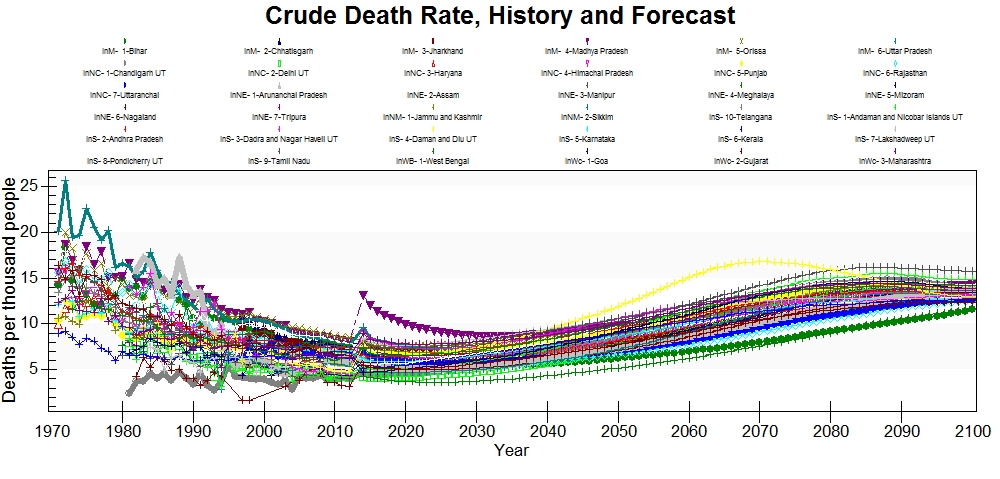India's Health Data: Difference between revisions
AltheaDitter (talk | contribs) No edit summary |
AltheaDitter (talk | contribs) No edit summary |
||
| Line 1: | Line 1: | ||
= Crude Birth Rates = | = Crude Birth Rates = | ||
Crude birth rates consist of two series that were blended together. | Crude birth rates consist of two series that were blended together. Both were published by the [[Ministry_of_Health_and_Family_Welfare_in_India|Ministry of Health and Family Welfare in India]]. The first series runs from 1971 through 2012 and has the bulk of the historical data. The second series was scraped from a report in PDF format and is the 2014 data. These two series blend well together and there do not appear to be any transients. | ||
= Crude Death Rates = | = Crude Death Rates = | ||
Revision as of 20:26, 25 April 2017
Crude Birth Rates
Crude birth rates consist of two series that were blended together. Both were published by the Ministry of Health and Family Welfare in India. The first series runs from 1971 through 2012 and has the bulk of the historical data. The second series was scraped from a report in PDF format and is the 2014 data. These two series blend well together and there do not appear to be any transients.
Crude Death Rates
Crude death rates consist of two series that were blended together. Both series were published by the Ministry of Health and Family Welfare in India. The first series runs from 1971 through 2012 and has the bulk of the historical data. The second series was scraped from a report in PDF format and is the 2014 data. These two series blend well and there do not appear to be any transients.
 Historically the highly populated state of Uttar Pradesh has the highest crude death rates. At model initialization there is an upward spike in all states in territories, most have only a small increase, but Madhya Pradesh has a substantial increase. The forecasts show Madhya Pradesh having the highest crude death rates into the future until sometime around 2040. After 2040 Daman and Diu's crude death rates are forecast to grow to be significantly higher than the rest of the states. This behavior is believed to be driven by the unusual age-sex cohort structure in this union territory. Daman and Diu have, what appears to be, a large migrant worker population. There are a disproportionate number of young working-aged men relative to the total population. It would appear that the model is forecasting this population's eventual deaths and because there are few children in Daman and Diu presently, the death rate will be disproportionately high.
Historically the highly populated state of Uttar Pradesh has the highest crude death rates. At model initialization there is an upward spike in all states in territories, most have only a small increase, but Madhya Pradesh has a substantial increase. The forecasts show Madhya Pradesh having the highest crude death rates into the future until sometime around 2040. After 2040 Daman and Diu's crude death rates are forecast to grow to be significantly higher than the rest of the states. This behavior is believed to be driven by the unusual age-sex cohort structure in this union territory. Daman and Diu have, what appears to be, a large migrant worker population. There are a disproportionate number of young working-aged men relative to the total population. It would appear that the model is forecasting this population's eventual deaths and because there are few children in Daman and Diu presently, the death rate will be disproportionately high.